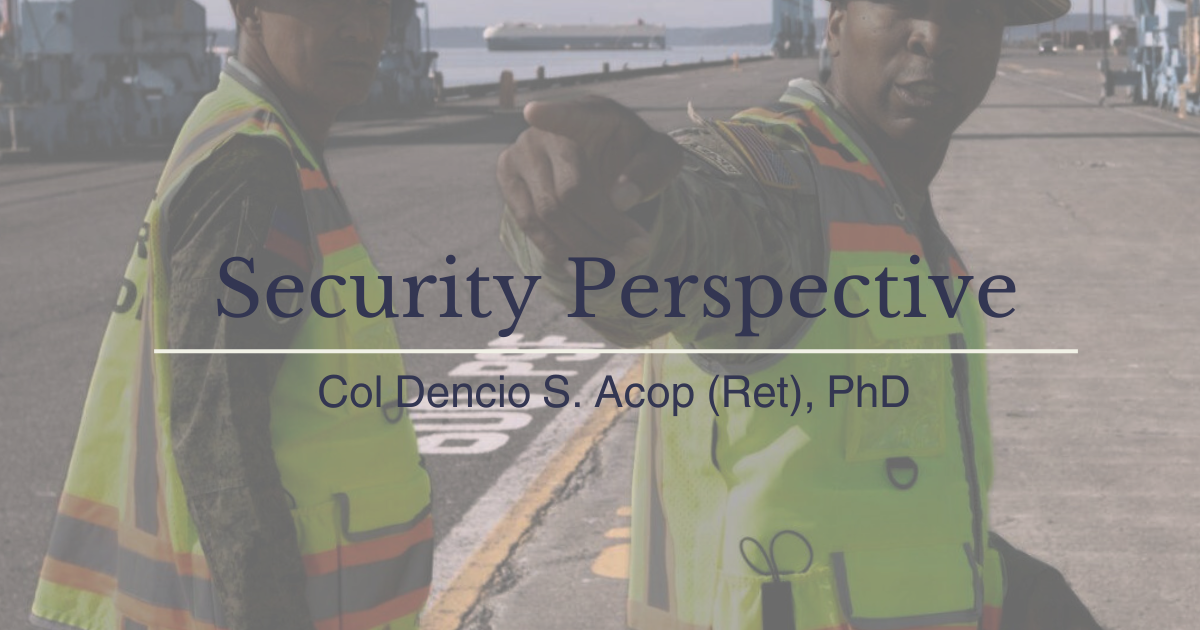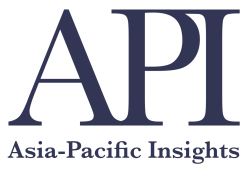The Value of Global Security: Updates from GSX 2024

By Col Dencio S. Acop (Ret), PhD, CPP | Date 09-26-2024
BOSTON, MASSACHUSETTS — How ready are you? Do you sometimes feel a false sense of security? What is going on with the world today? Everything seems to be moving so quickly you can’t keep up?
Truth is, indeed, there is a lot going on! And almost every individual on the planet can get overwhelmed by the amount of detail easily at hand. Technology of every kind is now upon us. If you are a young person, you might be at a slight advantage although not quite. There is also much value from real experience as there is with technological savviness. At any rate, Baby Boomers are now coexisting with Generation Alpha youngsters and all in-between, and together face the complexities of the 21st Century and beyond.
As a Baby Boomer, I have to say that my generation has seen it all from black and white television and no internet to just about every technological breakthrough there is now, the latest of which is artificial intelligence and machine learning. I just came out of the GSX 2024 Conference and my head is still spinning from all the dizzying learning I got from that security best practice hub.
I have been attending the yearly conference since I got certified and became a member of ASIS-International in 2007. Now, I am all pumped to write and share some of the important things I learned from the annual meet. There were a lot of presentations worthy of sharing but three main topics caught my attention: Former Finland Prime Minister Sanna Marin’s assessment of current global affairs, Mark Freedman’s presentation on protecting your business during great power competition, and Dr. Rana el Kaliouby’s discussion on the opportunities and risks of AI.
The first topic by Sanna Marin assessed current global affairs, especially in Europe where she resides. Marin’s thoughts are deeply insightful as they come from the strategic lenses of a former head of state.
Marin talked about the vulnerability of countries brought about by new developments like artificial intelligence as well as dependencies on critical imports from unfriendly exporters. While AI can be used for so much good, she laments that it could also be used to mine data impacting individual privacy, social norms and values, security, and even democratic elections.
She cited the case of Slovakia and even the United States where mined personal and other confidential data were used by Russia to sow disinformation and undermine foreign election outcomes to favor Russian national interests or Vladimir Putin’s. She also decried how Putin is using energy prices to weaken European support for Ukraine which Russia invaded in 2022. Many European countries import gas minerals from Russia to survive the long winter cold.
While some of these nations halted their importations following the invasion, a number of countries still do. These include Austria, Slovakia, Hungary, and Italy. Marin points out that such dependencies on imports from non-democratic countries by democratic ones are not only economic in nature but are also political and socio-cultural because they undermine democratic values.
She therefore advocates public-private partnerships not to decouple, but de-risk western reliance on non-democratic state exporters like Russia. For instance, the former PM is in favor of developing domestic investments in technologies that advance self-reliance if not partial importation of essential products from friendlier providers with low political risk.
This back-to-basics strategy, Marin argues, assures more domestic control of fundamental societal values. Lastly, Marin emphasized the need for global cooperation to effectively tackle the continuing threats posed by climate change and potential pandemics since these affect all areas of life. She said that only a collective responsibility of trust between peoples and their government, like what Finland is doing, can bring about effective collaboration for resilience against any kind of threat.
The second topic on protecting your business during great power competition by Mark Freedman not only discussed how critical corporate infrastructure can effectively address business during today’s great power competition. It also gave a lot of insights about the context of today’s global security environment and what everyone needs to know about the unseen connections between great state power and multinational business operations.
Freedman was actually pointing out the critical role played by Enterprise Security Risk Management (ESRM) in today’s complex security context. But before he dived into it, Freedman first gave a background that is important for all of us to understand. He said that the following are the time periods which give rise to the global security situation we find ourselves in today: 1947-1989 (Cold War), 2001-2018 (War on Terror), and 2018-Present (Great Power Competition).
The world today is dominated by the United States and China with Russia in the margins. The US is still the reigning power but there is now an insurgent power challenging the reigning power: China. In the time of the Cold War, the dominant global relationship was one of two relatively equal powers sharing as reigning powers, until the Soviet Union weakened and collapsed.
In each of these eras, it can be said that two fundamentally opposed societal orders lie at the core of the conflict: Democracy and Autocracy. During the Cold War, the opposing world orders were Democracy and Marxist-Communism. In the current world situation, the orders at odds with each other are still Communism and Democracy but this time led by China (a Maoist Communist) with Russia at the margins (a Marxist Communist).
Even the regional conflicts are somehow tied in with this global competition. For instance, Russia’s invasion of Ukraine does not only involve these two countries but rather involves the democratic Western alliances supporting Ukraine as well as the authoritarian alliances behind Russia. The same is true with the ongoing conflict in the Middle East between Israel and Hamas.
And with the brewing conflict in the South China Sea between China and Taiwan, and between China and the Philippines. On the one hand are western alliances supporting democratic allies, and on the other hand are authoritarian alliances behind non-democratic nations. These proxy wars continue and who is with the protagonists is revealed by who is funding and training who.
The realities behind these conflicts go beyond ideologies as they are also fueled by globalization and the information technology backbone that interconnects everybody into a global village. As Freedman argued, the global environment described is the context to which the ESRM infrastructure of every business player in the world today must now effectively and efficiently respond.
Finally, the third topic discussion on the opportunities and risks of artificial intelligence by AI pioneer Dr. Rana el Kaliouby provides us with new insights that are both extremely promising as they are disturbing. First, El Kaliouby points out that AI is here to stay and that the ongoing investments in it are simply mind-boggling.
Forbes reported that “Microsoft, BlackRock, GIP, and MGX join hands to raise $100B for AI data centers”. BOLD Capital founder Peter Diamandis warned: “There will be two kinds of companies at the end of this decade: those who are fully utilizing AI and those who will be out of business.” Second, the AI entrepreneur and investor argues that “ethically developed AI can augment and amplify human capabilities, helping us reimagine what it is to be human in the age of AI” (GSX 2024).
She believes AI can be humanity’s co-intelligence in productivity and learning as well as in sustainable living. However, the scientist admits that there are also associated risks and ethical considerations with AI. And this brings us to our third point: AI can have a dangerous territory in AI hallucinations, bias, and disinformation.
These downsides to AI involve the production of untruths or half-truths portrayed as truths. For instance, el Kaliouby narrated a story about her daughter who could not find the source references for an AI product she found useful for her homework. As it turned out, she could not find it because it did not exist. The product was merely what is now termed as an AI hallucination.
Fourth, AI currently has a diversity problem. It cannot accurately identify certain entities, say – women of color, among others, according to the scientist. Fifth, Gen AI is bad for the planet and not sustainable. According to the presenter, “Gen AI requires massive compute energy and has a large carbon footprint (-1% of global emissions annually)”. As of this writing, big tech companies are already hoarding AI chips causing massive shortages due to increasing demand for AI chips.
Now, let’s look at AI’s impact on the security industry. El Kaliouby sees both enhanced security capabilities and capacities as well as challenges in the oncoming age of AI. Sixth, she asks what kind of social contract would exist with AI working side by side with humans. Seventh, she warns about the ethical development and deployment of AI. Eighth, she advises much research and analyses to go into the development of AI regulation and AI governance. Ninth, she points out though that security will tremendously benefit from AI in terms of becoming a lot more proactive and predictive than just being reactive. Much of her views are actually echoed by most among the attendees and the larger security industry practitioners.
To conclude, GSX 2024 certainly provided the continuing best practice education and training information needed by today’s global security practitioners. The three topics highlighted here merely provide a snapshot of the multifarious sessions from the annual conference. Sanna Marin’s assessment of current global affairs especially in Europe, provides a strategic where she resides.
Tags: Security
